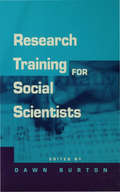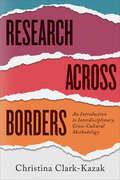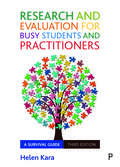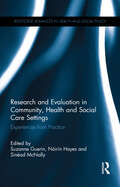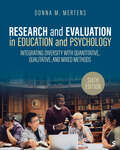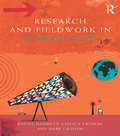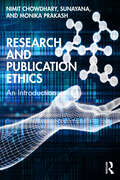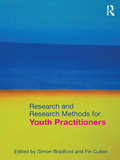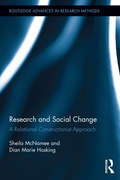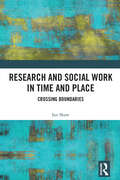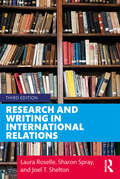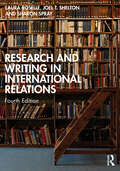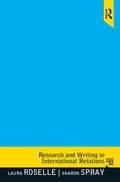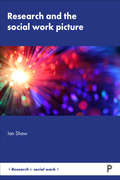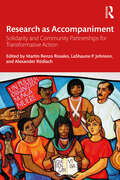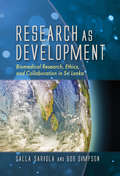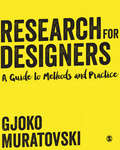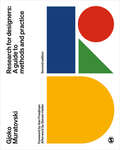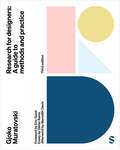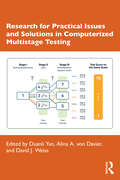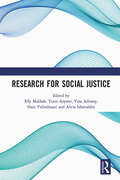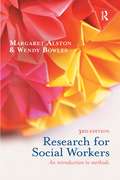- Table View
- List View
Research Training for Social Scientists: A Handbook for Postgraduate Researchers
by Dawn BurtonWith indispensable advice for students from all social science backgrounds, this handbook provides the core conceptual and practical skills to embark on succesful research. The organization of the book reflects the knowledge that is required in order to become a competent and effective researcher. It follows the life-cycle of the research project: it begins with a discussion of ethical and philosphical issues; presents guides to both quantitative and qualitative data collection and analysis; provides help on using computers in research; and includes advice on how to write up and present a research project. Based on the UK Economic and Social Research Council advice on the training which students should undertake in preparation for postgraduate research, this book will be invaluable for all beginning researchers.
Research across Borders: An Introduction to Interdisciplinary, Cross-Cultural Methodology
by Christina Clark-KazakIn order to understand positionality as it relates to research, it is important to learn how to identify and reflect on how knowledge is produced and reproduced. Research across Borders introduces key concepts and methods to understand and critically analyze research in academic books and journals, as well as in media, government reports, and anywhere else information is found. This book addresses the opportunities and challenges of undertaking research in international, cross-border, and cross-cultural contexts. Specifically designed for students studying interdisciplinary or international programs on topics such as human rights, conflict studies, international relations, global development, and migration, Research across Borders provides the methodological, ethical, and epistemological foundations for understanding research across different disciplines. Whether students are gathering information from secondary sources or conducting primary research, Research across Borders aims to help readers become better researchers.
Research and Evaluation for Busy Students and Practitioners: A Survival Guide
by Helen KaraResearch doesn’t exist in a bubble but co-exists with a multitude of other tasks and commitments, yet there is more need for people to save time than ever before. Brilliantly attuned to the demands placed on researchers, this book considers how students, academics and professionals alike can save time and stress without compromising the quality of their research or its outcomes. This third edition: - is fully revised with new chapters on research and evaluation ethics, creative methods of collecting data and how research can make a positive difference; - includes illustrative case studies throughout the book, and each chapter concludes with exercises, discussion questions and a debate topic; - is accompanied by a fully updated companion website. This supportive book is designed for any student or practitioner who wants to know how to do research on top of their main job, and still have a life.
Research and Evaluation in Community, Health and Social Care Settings: Experiences from Practice
by Suzanne Guerin Nóirín Hayes Sinéad McNallyHow can we develop a comprehensive understanding of the research process in community, health and social care settings? Covering all stages of the research process, from funding to dissemination, this book considers the views of funders, researchers, communities and policy makers. Drawing on practical examples and relevant international literature, it sheds light on issues that can arise in the process and presents solutions and strategies to deal with a range of challenges. Organised around a series of themes that capture the essential elements of the research process including covering framing research in theory, commissioning and designing research, utilisation of findings and knowledge transfer, this book provides practical guidance for those involved in child welfare and education, nursing and clinical practices, community studies and the social sciences. It will be a key resource for all those who are interested in developing their understanding of the research and evaluation process in these areas.
Research and Evaluation in Education and Psychology: Integrating Diversity With Quantitative, Qualitative, and Mixed Methods
by Donna M. MertensIdentify, evaluate, and practice good research using Research and Evaluation in Education and Psychology: Integrating Diversity With Quantitative, Qualitative, and Mixed Methods by renowned scholar Donna M. Mertens. This introductory research methods text incorporates the viewpoints of various research paradigms into its descriptions of qualitative, quantitative, and mixed methods as well as program evaluation. The work covers five major paradigms: post-positivist, constructivist, transformative, pragmatic, and Indigenous. Special emphasis on conducting research with culturally complex communities, based on the perspectives of feminists, ethnic/racial minorities, and people with disabilities is a hallmark of this text. In each chapter, the author carefully explains each step of the research process, from the literature review to analysis and reporting. Additionally, each chapter includes a published sample study and abstract to illustrate the concepts discussed in that chapter. The Sixth Edition includes more on community engagement, recent advances in mixed methods, new applications of theoretical frameworks, and the latest research examples. Citations and references have all been updated to reflect the seventh edition of the Publication Manual of the American Psychological Association. Included with this title: LMS Cartridge: Import this title’s instructor resources into your school’s learning management system (LMS) and save time. Don’t use an LMS? You can still access all of the same online resources for this title via the password-protected Instructor Resource Site.
Research and Evaluation in Education and Psychology: Integrating Diversity With Quantitative, Qualitative, and Mixed Methods
by Donna M. MertensIdentify, evaluate, and practice good research using Research and Evaluation in Education and Psychology: Integrating Diversity With Quantitative, Qualitative, and Mixed Methods by renowned scholar Donna M. Mertens. This introductory research methods text incorporates the viewpoints of various research paradigms into its descriptions of qualitative, quantitative, and mixed methods as well as program evaluation. The work covers five major paradigms: post-positivist, constructivist, transformative, pragmatic, and Indigenous. Special emphasis on conducting research with culturally complex communities, based on the perspectives of feminists, ethnic/racial minorities, and people with disabilities is a hallmark of this text. In each chapter, the author carefully explains each step of the research process, from the literature review to analysis and reporting. Additionally, each chapter includes a published sample study and abstract to illustrate the concepts discussed in that chapter. The Sixth Edition includes more on community engagement, recent advances in mixed methods, new applications of theoretical frameworks, and the latest research examples. Citations and references have all been updated to reflect the seventh edition of the Publication Manual of the American Psychological Association. Included with this title: LMS Cartridge: Import this title’s instructor resources into your school’s learning management system (LMS) and save time. Don’t use an LMS? You can still access all of the same online resources for this title via the password-protected Instructor Resource Site.
Research and Fieldwork in Development
by Daniel Hammett Chasca Twyman Mark GrahamResearch and Fieldwork in Development explores both traditional and cutting edge research methods, from interviews and ethnography to spatial data and digital methods. Each chapter provides the reader with an understanding of the theoretical basis of research methods, reflects upon their practice and outlines appropriate analysis techniques. The text also provides a cutting edge focus on the role of new media and technologies in conducting research. The final chapters return to a set of broader concerns in development research, providing a new and dynamic set of engagements with ethics and risk in fieldwork, integrating methods and engaging development research methods with knowledge exchange practices. Each chapter is supported by several case studies written by global experts within the field, documenting encounters and experiences and linking theory to practice. Each chapter is also complimented by an end of chapter summary, suggestions for further reading and websites, and questions for further reflection and practice. The text critically locates development research within the field of international development to give an accessible and comprehensive introduction to development research methods. This book provides an invaluable overview to the practice of international development research and serves as an essential resource for undergraduate and postgraduate student embarking of development fieldwork. It is supported by online resources including extended bibliographies for each chapter, example risk and ethic forms, example policy briefing notes, research reports, links to websites and data sources.
Research and Publication Ethics: An Introduction
by Nimit Chowdhary Sunayana Monika PrakashThis book provides a comprehensive overview of research and publication ethics and guides young researchers on how to conduct ethical research and publish their work responsibly. It presents an understanding of ethical practices in research and how they apply to research and publication by examining the different ethical theories and their application. The book also discusses the different factors influencing ethical decision-making and probes into the ethical issues that can arise in the research process. It explores the different forms of scientific misconduct, such as data fabrication and falsification, plagiarism, and conflicts of interest, and provides strategies for ethical research. The book also details the impact of scientific misconduct on research and publication and the strategies for preventing and detecting misconduct.Aligning to the belief that promoting ethical research practices is essential for advancing science and society, this book will be helpful for young researchers, scholars, aspiring researchers, and academicians interested in ethical research practices in multiple disciplines.
Research and Research Methods for Youth Practitioners
by Simon Bradford Fin CullenRigorous research is crucial to effective work with young people and increasingly youth practitioners need to be able to develop, review and evidence their work using a variety of research and assessment tools. This text equips students and practitioners with a thorough understanding of research design, practice and dissemination, as well as approaches to evidence-based practice. A clear practice framework informs the book, outlining the significance of research to youth work, especially in relation to designing and developing services for young people. Research and Research Methods for Youth Practitioners: Analyses the research/practitioner role Explores the ethical context of research in youth work Offers a thorough analysis of key methodological questions in research in practice Provides a guide to data collection and analysis Presents five principal research strategies for youth work: ethnographic work and visual methods; interviewing and evaluation; surveys and evaluation; the use of secondary data and documentary analysis; and researching virtual and online settings Discusses the implications of research for work with young people as well as its dissemination. Written by experienced researchers and practitioner-researchers, each chapter in this accessible textbook includes an overview, a critical discussion of the pros and cons of the particular method or approach, a case study, a practice-based task, a summary and suggestions for further reading. This textbook is invaluable for student and practising youth workers. It is also a useful reference for other practitioners working with young people.
Research and Social Change: A Relational Constructionist Approach (Routledge Advances in Research Methods)
by Sheila McNamee Dian Marie HoskingThis book bridges scholarly forms of inquiry and practitioners’ daily activities. It introduces inquiry as a process of relational construction, offering resources to practitioners who want to reflect on how their work generates practical effects. There are hundreds of books on research, but in keeping with social scientific traditions, many emphasize method and neglect broader, overarching assumptions and interests. Further, most are written in ways that speak to those in the academic community and not to a wider audience of professionals and practitioners. The present text lays out relational constructionist premises and explores these in terms of their generative possibilities both for inquiry and social change work. It is applicable for professionals in the fields of social services, education, organizational consulting, community work, public policy, and healthcare. Using accessible language and extensive use of case examples, this book will help reflective practitioners or practice-oriented academics approach inquiry in ways that are coherent and consistent with a relational constructionist orientation. This volume will be useful for undergraduates, graduate students, and practitioners engaged in professional development, with particular use for those scholar-practitioners who want to reflect on and learn from their practice and who want to produce practical results with and for those with whom they are working. It is also aimed at those scholar-practitioners who want to contribute to a wider understanding of how social relations (groups, organizations, communities, etc.) can work effectively.
Research and Social Work in Time and Place: Crossing Boundaries
by Ian ShawThis volume, which brings together chapters and journal articles published by renowned academic Ian Shaw, focusses on the practice/research relationship within social work – a theme that has preoccupied much of his writing over the last forty or more years. These pieces show the academic development of his understanding of the complexity and challenge of that relationship, as well as the shifts which have occurred in it over time. Divided into four sections • Forming Professional Practice • Forming Social Work Research • Chicago, Sociology and Social Work • Critical Tributes and Debates and comprised of 31 chapters, it will be of interest to all scholars of social work, and allied subjects including sociology, allied health, social policy and disability studies.
Research and Writing in International Relations
by Laura Roselle Joel T. Shelton Sharon SprayResearch and Writing in International Relations, Third Edition, offers the step-by-step guidance and the essential resources needed to compose political science papers that go beyond description and into systematic and sophisticated inquiry. This book provides concise, easy-to-use advice to help students develop more advanced papers through step-by-step descriptions, examples, and resources for every stage of the paper writing process. The book focuses on areas where students often need guidance: understanding how international relations theory fits into research, finding a topic, developing a question, reviewing the literature, designing research, and last, writing the paper. Including current and detailed coverage on how to start research in the discipline’s major subfields, Research and Writing in International Relations gives students a classroom-tested approach that leads to better research and writing in introductory and advanced classes. New to the Third Edition: A new first chapter that gives an overview of the relationship between international relations theory and research in international relations, demonstrating how theoretical frameworks shape the concepts utilized, topics selected, and questions posed in international relations research. Revised topic chapters that include updates to the scholarly literature and data sources Revised descriptions of the areas of study that incorporate new research topics (like global inequality) Additional perspectives from international relations theory.
Research and Writing in International Relations
by Laura Roselle Joel T. Shelton Sharon SprayResearch and Writing in International Relations, Fourth Edition, offers the step-by-step guidance and the essential resources needed to compose political science papers that go beyond description and into systematic and sophisticated inquiry.This book provides concise, easy-to-use advice to help students develop more advanced papers through step-by-step descriptions, examples, and resources for every stage of the paper writing process. The book focuses on areas where students often need guidance: understanding how international relations theory fits into research, finding a topic, developing a question, reviewing the literature, designing research, and last, writing the paper. Including current and detailed coverage on how to start research in the discipline’s major subfields, Research and Writing in International Relations gives students a classroom-tested approach that leads to better research and writing in introductory and advanced classes. New to the Fourth Edition: Expanded guidance on formulating and refining effective research questions Recommendations for navigating the use of information sources popular with students, such as social networks, podcasts, and other digital media Additional focus on areas of particular challenge for students, such as avoiding plagiarism Advice on how to responsibly use AI to assist in the research and writing process Revised topic chapters that include updates to the scholarly literature and data sources New resources on research topics of special interest to students, including global climate change, international pandemic response, and democratic backsliding
Research and Writing in International Relations
by Laura Roselle Sharon SprayResearch and Writing in International Relations offers the step-by-step guidance and the essential resources needed to compose political science papers that go beyond description and into systematic and sophisticated inquiry.This text focuses on areas where students often need help–finding a topic, developing a question, reviewing the literature, designing research, and last, writing the paper. Including current and detailed coverage on how to start research in the discipline’s major subfields, Research and Writing in International Relations gives students a classroom-tested approach that leads to better research and writing in introductory and advanced courses.
Research and the Social Work Picture (Research in Social Work)
by Ian ShawThere’s a growing pressure for social workers to engage with research and draw on this in practice. But why is this research important? This first book in the Research in Social Work series, published in association with the European Social Work Research Association, provides an accessible way to think about this question. Drawing on evidence from across Europe, Asia and the USA, it covers how research is conducted, used, and perceived. It is perfect for social work students, researchers and practitioners, providing a detailed sketch of how research finds a place in the wider social work picture and offering opportunities and exercises that highlight how social work research is relevant in day-to-day course programmes and practice. The book will embolden a kind of scepticism, while at the same time providing the ground work for social workers to become more thoughtfully practical – and practically thoughtful.
Research as Accompaniment: Solidarity and Community Partnerships for Transformative Action
by Alexander Rödlach Martín Renzo Rosales LaShaune P. JohnsonThis volume expands conversations about participatory, community-engaged, and action-oriented research that inspires social change.The authors contend that long-term community partnerships, inspired by solidarity and characterized by equality and reciprocity, result in a deep understanding of community concerns and increase the likelihood that research findings will have an impact on both the community partners and the broader society. Such research relationships, the authors maintain, are best understood as accompaniment. This book recognizes the potential as well as constraints of conceptualizing research as accompaniment and emphasizes that this approach is both a continuum and a process.Suitable for students and scholars of ethnographic and qualitative methods (and professionals using those methods, such as those in non-government organizations), it will appeal to those interested in research with communities in a wide variety of social science and other disciplines, including anthropology, nursing, and public health, amongst others.
Research as Development: Biomedical Research, Ethics, and Collaboration in Sri Lanka
by Robert Simpson Salla SariolaIn Research as Development, Salla Sariola and Bob Simpson show how international collaboration operates in a setting that is typically portrayed as "resource-poor" and "scientifically lagging." Based on their long-term fieldwork in Sri Lanka, Sariola and Simpson bring into clear ethnographic focus the ways international scientific collaborations feature prominently in the pursuit of global health in which research operates "as" development and not merely "for" it. The authors follow the design, inception, and practice of two clinical trials: one a global health charity funded trial and the other a pharmaceutical industry-sponsored trial. Research as Development situates these two trials within their historical, political and cultural contexts and thus counters the idea that local actors are merely passive recipients of new technical and scientific rationalities. While social studies of clinical trials are beginning to be an established niche in academic writing, Research as Development helps fill important gaps in the literature through its examination of clinical research situated in cultures in low-income settings. Research as Development is noteworthy for the way it highlights the critical and creative role that local researchers play in establishing international collaborations and making them work into locally viable forms. The volume shows how these clinical and research interactions bring about changes in culture, technologies and expertise in Sri Lanka, contexts that have not previously been written about in any detail.
Research for Designers: A Guide to Methods and Practice
by Gjoko Muratovski'Today, designers design services, processes and organizations; craft skills no longer suffice. We need to discover, define and solve problems based upon evidence. We need to demonstrate the validity of our claims. We need a guide to design research that can educate students and be a reference for professionals. And here it is: a masterful book for 21st century designers.' - Don Norman, Professor and Director of Design Lab, University of California San Diego, and former Vice President, Advanced Technologies, Apple 'Muratovski provides a structured approach to introducing students and researchers to design research and takes the reader through the research process from defining the research problem to the literature review on to data collection and analysis. With such practical and useful chapters, this book should prove to be essential reading in design schools across the world.' - Tracy Bhamra, Professor of Sustainable Design and Pro Vice-Chancellor of Enterprise, Loughborough University Design is everywhere: it influences how we live, what we wear, how we communicate, what we buy, and how we behave. In order for designers to design for the real world, defining strategies rather than just implementing them, they need to learn how to understand and solve complex, intricate and often unexpected problems. This book is a guide to this new creative process. With this book in hand, students of design will: understand and apply the vocabulary and strategies of research methods learn how to adapt themselves to unfamiliar situations develop techniques for collaborating with non-designers find and use facts from diverse sources in order to prove or disprove their ideas make informed decisions in a systematic and insightful way use research tools to find new and unexpected design solutions. Research for Designers is an essential toolkit for a design education and a must-have for every design student who is getting ready to tackle their own research.
Research for Designers: A Guide to Methods and Practice
by Gjoko MuratovskiDesign is everywhere. It influences how we live, what we wear, how we communicate, what we buy, and how we behave. To design for the real world and define strategies rather than just implement them, you need to learn how to understand and solve complex, intricate and often unexpected problems. Research for Designers is the guide to this new, evidence-based creative process for anyone doing research in Design Studies or looking to develop their design research skills. The book: Takes an organized approach to walking you through the basics of research. Highlights the importance of data. Encourages you to think in a cross-disciplinary way. Including interviews with 10 design experts from across the globe, this guide helps you put theory into practice and conduct successful design research.
Research for Designers: A Guide to Methods and Practice
by Gjoko MuratovskiDesign is everywhere. It influences how we live, what we wear, how we communicate, what we buy, and how we behave. To design for the real world and define strategies rather than just implement them, you need to learn how to understand and solve complex, intricate and often unexpected problems. Research for Designers is the guide to this new, evidence-based creative process for anyone doing research in Design Studies or looking to develop their design research skills. The book: Takes an organized approach to walking you through the basics of research. Highlights the importance of data. Encourages you to think in a cross-disciplinary way. Including interviews with 10 design experts from across the globe, this guide helps you put theory into practice and conduct successful design research.
Research for Designers: A Guide to Methods and Practice
by Gjoko MuratovskiTo make meaningful contributions and to drive innovation, designers first need to learn to ask the right questions so that they can identify what the real problems are. They also need to learn how to conduct research to resolve these problems. Research for Designers is a guide to this new, evidence-based creative process. This seminal, bestselling book by Gjoko Muratovski is unique in the way it bridges academia and industry, as well as research and practice. The book also expands the notion of what design is, and what it can be in the 21st century. In this fresh, newly updated third edition you will find: - Updated content with reflections by leading industry experts and researchers. - New, cutting-edge content on quantitative research, user experience research, corporate identity design - A brand new set of expert interviews by high profile designers and design leaders - A seminal essay by the legendary industrial designer Dieter Rams, whose design philosophy continues to inspire the design world. - Even more real-world cases. Incorporating interviews with design experts from across the globe, Research for Designers is an essential guide for anyone practicing design, or doing research in design, engaging in design studies, or looking to develop their research skills.
Research for Designers: A Guide to Methods and Practice
by Gjoko MuratovskiTo make meaningful contributions and to drive innovation, designers first need to learn to ask the right questions so that they can identify what the real problems are. They also need to learn how to conduct research to resolve these problems. Research for Designers is a guide to this new, evidence-based creative process. This seminal, bestselling book by Gjoko Muratovski is unique in the way it bridges academia and industry, as well as research and practice. The book also expands the notion of what design is, and what it can be in the 21st century. In this fresh, newly updated third edition you will find: - Updated content with reflections by leading industry experts and researchers. - New, cutting-edge content on quantitative research, user experience research, corporate identity design - A brand new set of expert interviews by high profile designers and design leaders - A seminal essay by the legendary industrial designer Dieter Rams, whose design philosophy continues to inspire the design world. - Even more real-world cases. Incorporating interviews with design experts from across the globe, Research for Designers is an essential guide for anyone practicing design, or doing research in design, engaging in design studies, or looking to develop their research skills.
Research for Practical Issues and Solutions in Computerized Multistage Testing
by David J. Weiss Yan, Edited by Duanli von Davier, Alina A.This volume presents a comprehensive collection of the latest research findings supporting the current and future implementations and applications of computerized multistage testing (MST).As a sequel to the widely acclaimed Computerized Multistage Testing: Theory and Applications (2014) by Yan, von Davier, and Lewis, this volume delves into the experiences, considerations, challenges, and lessons learned over the past years. It also offers practical approaches and solutions to the issues encountered. The topics covered include purposeful MST designs, practical approaches for optimal design, assembly strategies for accuracy and efficiency, hybrid designs, MST with natural language processing, practical routing considerations and methodologies, item calibration and proficiency estimation methods, routing and classification accuracy, added value of process data, prediction and evaluation of MST performance, cognitive diagnostic MST, differential item functioning, robustness of statistical methods, simulations, test security, the new digital large-scale Scholastic Aptitude Test, software for practical assessment and simulations, artificial intelligence impact, and the future of adaptive MST.This volume is intended for students, faculty, researchers, practitioners, and education officers in the fields of educational measurement and evaluation in the United States and internationally.
Research for Social Justice: Proceedings of the International Seminar on Research for Social Justice (ISRISJ 2018), October 30, 2018, Bandung, Indonesia
by Tutin Aryanti Hani Yulindrasari Vina Adriany Elly MalihahIndividuals are equipped with a wide range of knowledge that enhances their employability, health, family life, and social engagement. On this basis, providing equality for all has been set to be achieved as one of the United Nations sustainable development priorities. However, the international understandings are not only of what equality and inclusivity entail but also the social vision to achieve social justice. Best practices provide a meaningful cross-national discussion with respect to the following topics: power relations within research, social inequalities in society, science research for social justice, the redefinition of the notion of social justice, education for social justice, spatial justice, the research of gender and marginalized groups, the re-conceptualization of the epistemological foundation of research, hegemonic discourses on research, science technology for social justice and welfare, as well as culture and social justice.This edited book aims to provide a new perspective for other benefits of research because generally, the research carried out only aims to answer scientific problems and often override aspects of humanities. In response to these concerns, the book attempts to re-map the main objectives of the research. The authors in this book offer new perspectives, especially in formulating the purposes of the studies they will perform. Therefore, this book presents a unique review of research with a variety of approaches that are coherent with the state of society in the world, followed by eleven scopes of various cases from a variety of perspectives that highlight theoretical and methodological questions about research and social justice. This book presents outstanding applications through multiple types of approaches that are relevant to the current context of world community issues. The articles in this book will be of interest to undergraduate and graduate students, as well as researchers who are interested in the social field, especially research for social justice.
Research for Social Workers: An Introduction to Methods
by Margaret Alston Wendy BowlesSocial work is developing its own research orientation and knowledge base, springing from the research traditions of sociology and psychology and grounded in human rights and social justice. Effective social research relies on critical thinking and the ability to view situations from new perspectives. It is relevant to every area of social work practice: from the initial stages of an intervention, to planning a course of action, and finally evaluating practice. Research for Social Workers is an accessible introduction to the research methods most commonly used in social work and social welfare. The major stages of research projects are outlined step by step, including analysing results and reporting. It is written in non-technical language for students and practitioners without a strong maths background. Illustrated with examples from across the world, this book captures the realities of social work research in a wide range of settings. End of chapter exercises and questions make this an ideal introduction to research methods. This third edition is fully revised and updated. It includes new chapters on systematic reviews and research in crisis situations, as well as more substantial coverage of statistics.
